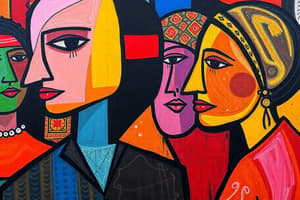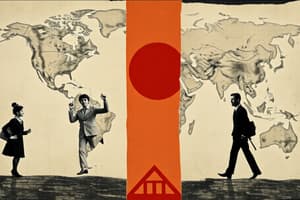Podcast
Questions and Answers
What is the definition of culture as mentioned in the content?
What is the definition of culture as mentioned in the content?
- Only the shared values and beliefs of a society.
- The arts created by elites.
- The ways of thinking, acting, and material objects that form a people’s way of life. (correct)
- The sum of biological aspects of a society.
How does culture influence social interaction?
How does culture influence social interaction?
- By regulating only economic behavior.
- By determining genetic traits of individuals.
- By providing shared knowledge that facilitates interactions. (correct)
- By creating a common language understood only by elites.
What does culture shock refer to?
What does culture shock refer to?
- The process of cultural diffusion among societies.
- The personal disorientation when experiencing an unfamiliar way of life. (correct)
- The clash of high culture and folk culture.
- The excitement of learning new languages.
Which of the following is NOT considered a cultural universal?
Which of the following is NOT considered a cultural universal?
What term describes individuals who consume a variety of cultural forms across different levels?
What term describes individuals who consume a variety of cultural forms across different levels?
Which of the following aspects is NOT a component of culture?
Which of the following aspects is NOT a component of culture?
What best describes 'high' culture?
What best describes 'high' culture?
Which statement about cultural diversity is true?
Which statement about cultural diversity is true?
What term describes the coexistence of local responses to global influences?
What term describes the coexistence of local responses to global influences?
What phenomenon involves the appropriation of culture for profit as described by Adorno and Horkheimer?
What phenomenon involves the appropriation of culture for profit as described by Adorno and Horkheimer?
Which of the following best represents the idea of cultural cross-fertilisation?
Which of the following best represents the idea of cultural cross-fertilisation?
Which of the following concepts is NOT associated with globalization?
Which of the following concepts is NOT associated with globalization?
What is described as the blend of cultures resulting from globalization?
What is described as the blend of cultures resulting from globalization?
What distinguishes a subculture from the dominant culture?
What distinguishes a subculture from the dominant culture?
Which of the following best describes the concept of cultural repertoires?
Which of the following best describes the concept of cultural repertoires?
What are symbolic boundaries in cultural sociology?
What are symbolic boundaries in cultural sociology?
How does the cognitive turn in cultural sociology affect understanding of culture?
How does the cognitive turn in cultural sociology affect understanding of culture?
What aspect of lifestyles is often influenced by the state, media, and education in Irish society?
What aspect of lifestyles is often influenced by the state, media, and education in Irish society?
Which statement reflects the dynamic view of culture?
Which statement reflects the dynamic view of culture?
What is a common characteristic of cultural trends measured in sociological studies?
What is a common characteristic of cultural trends measured in sociological studies?
What does the concept of cultural consumption versus cultural production imply?
What does the concept of cultural consumption versus cultural production imply?
Flashcards
Cultural Diffusion
Cultural Diffusion
The spreading and mixing of different cultures due to globalization, leading to new and diverse cultural forms.
Cultural Imperialism
Cultural Imperialism
The dominance of one culture over another, often used to describe the influence of Western culture on other parts of the world. It can be seen as a form of cultural imperialism.
Glocalization
Glocalization
The process where globalized cultural influences are adapted to local contexts, creating unique hybrid versions of global trends.
Cultural Industry Complex
Cultural Industry Complex
Signup and view all the flashcards
Cultural Cross-Fertilisation
Cultural Cross-Fertilisation
Signup and view all the flashcards
Culture
Culture
Signup and view all the flashcards
Culture Shock
Culture Shock
Signup and view all the flashcards
Material Culture
Material Culture
Signup and view all the flashcards
Non-Material Culture
Non-Material Culture
Signup and view all the flashcards
Subculture
Subculture
Signup and view all the flashcards
Cultural Universals
Cultural Universals
Signup and view all the flashcards
Cultural Omnivores
Cultural Omnivores
Signup and view all the flashcards
Cultural Consumption vs. Cultural Production
Cultural Consumption vs. Cultural Production
Signup and view all the flashcards
Cultural Repertoire
Cultural Repertoire
Signup and view all the flashcards
Symbolic Boundaries
Symbolic Boundaries
Signup and view all the flashcards
Cultural Repertoires in France vs. US
Cultural Repertoires in France vs. US
Signup and view all the flashcards
Culture as dynamic and situationally specific
Culture as dynamic and situationally specific
Signup and view all the flashcards
Culture as stable
Culture as stable
Signup and view all the flashcards
Cultural Tool Kit
Cultural Tool Kit
Signup and view all the flashcards
Study Notes
Culture
- Culture is defined as the ways of thinking, acting, and material objects that shape a people's way of life (Macionis 2007, p.40).
- Culture is symbolic and learned, non-biological aspects of human societies.
- It distinguishes civilized from nature.
- Culture and structure are seen as "cement".
- Culture and material are linked, with material often shaping culture.
- Culture is internally inconsistent and situationally specific (Lamont/Thévenot 2000).
- Culture can be stable — with shared latent processes linking beliefs to actions — or dynamic, using toolkits or inconsistent narratives for sense-making (Polavieja 2015).
Priority Reading
- Students should consult Terrible, Magnificent Sociology...
- Becker, H.S. (1982) "Culture: a sociological view," in Yale Review, 71(4), 513–27.
Learning Outcomes
- Understand culture from a sociological perspective.
- Understand why culture matters.
- Understand the concept of culture shock.
- Understand subcultures.
- Understand cultural diversity and diffusion.
Types of Culture
- "High" culture refers to the arts and is typically associated with elites.
- Folk or "low" culture refers to crafts and is usually associated with ordinary people.
- Pop culture is popular, not highbrow, arguably emerging from "below".
- How do association/proximity to certain cultures influence perceptions?
Consuming Culture
- The rise of "cultural omnivores" who consume a wide variety of culture, encompassing both highbrow and middle-lowbrow forms (Chan/Turner 2017; Fishmann/Lizardo 2013).
- Example: attending opera and watching "Love Island" or a football match.
Importance of Culture
- Culture provides the shared knowledge that enables successful social interaction.
- Culture significantly influences our ideals.
- Culture shapes the social rules governing our behavior and interactions.
- Culture impacts our creation of goods and our evaluations of other cultures.
Aspects of Culture
- Culture includes language, symbols, values, beliefs, norms, practices, and artifacts.
Cultural Universals
- Cultural universals include language, family systems, marriage, religious rituals, property rights, and incest prohibitions.
- Other universals include art, dance, bodily adornment, games, gift-giving, joking, and rules of hygiene.
Cultural Diversity
- Diverse human cultures exhibit variability in material and non-material aspects.
- Culture shock arises from disorientation when encountering an unfamiliar way of life (Macionis 2007, 41).
- Cultural diversity exists both across and within societies.
Subcultures
- A subculture is a smaller group within a larger, dominant or mass culture.
- Subcultures are characterized by specific values, attitudes, beliefs, tastes, and behavior patterns that distinguish them from the mainstream (Bruce and Yearly 2006, p.298).
- Subcultures share some similarities with the dominant culture but differ in values, norms, and language.
- Subculture members often feel a sense of belonging and identity.
Culture in Datasets
- Culture is reflected in sociological studies through interests in music, attendance at concerts/museums/sports, tastes in food (e.g., organic), and attitudes towards politics, work, environment, and reading.
Culture and Lifestyles
- Reflect on cultural consumption versus cultural production.
- How are certain lifestyles valued in Irish society?
- Major contributors to lifestyle valuation include the state, media, and education.
Cultural Sociology
- Symbolic boundaries define social groups (see Michèle Lamont's work).
- "Cultural repertoires" are readily available based on national contexts.
- Cultural schemas (mental maps) are defined by cognitive frameworks learned through interaction (DiMaggio 1997).
- Note cultural variations in descriptions of action, such as civic/moral versus market, comparing France and the US (Lamont/Thévenot 2000).
Next Lecture
- The next lecture will cover values and norms.
Additional Recommended Readings
- Includes various books on sociology, cultural theory, subcultures, and related topics from various authors.
Studying That Suits You
Use AI to generate personalized quizzes and flashcards to suit your learning preferences.




